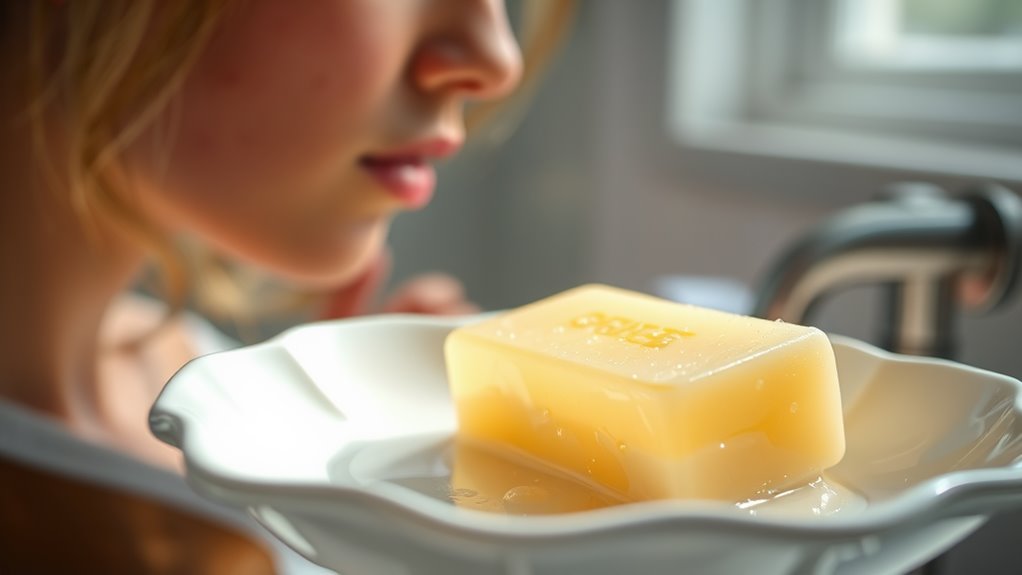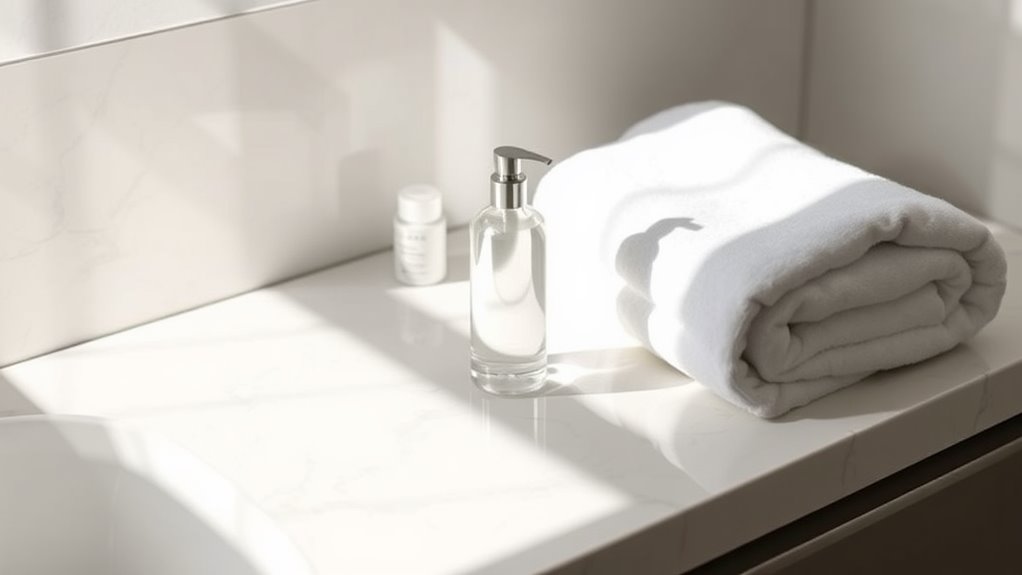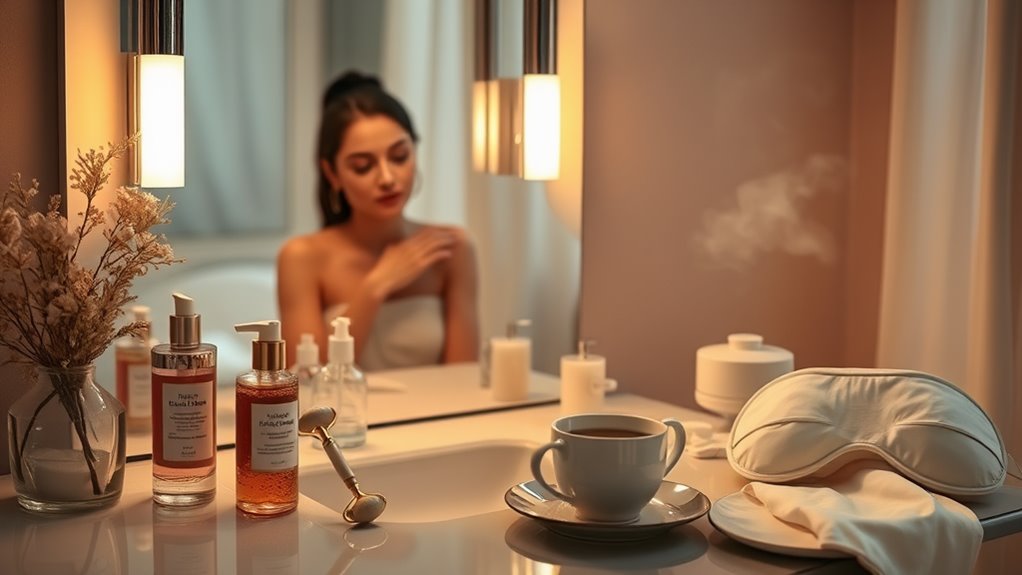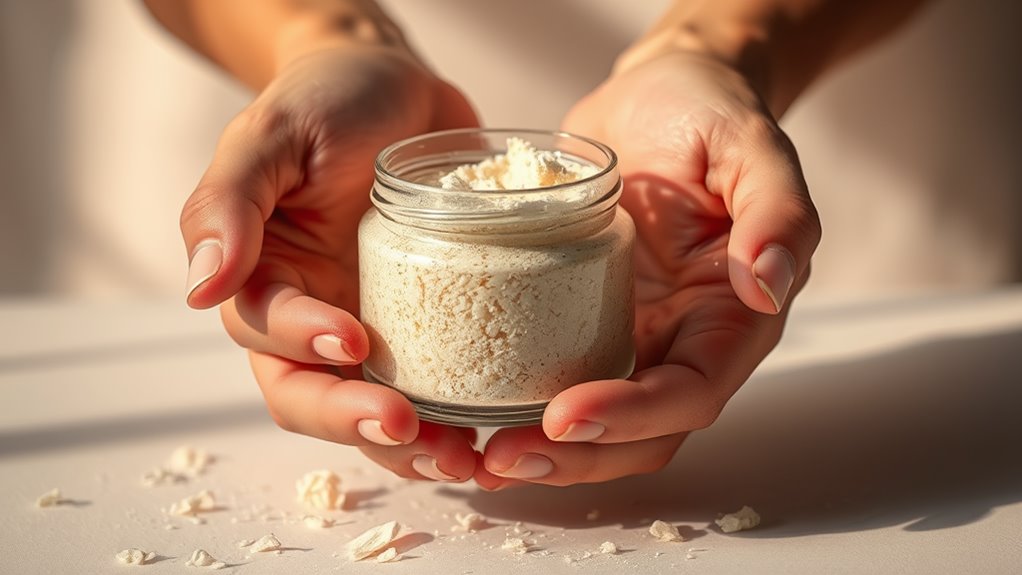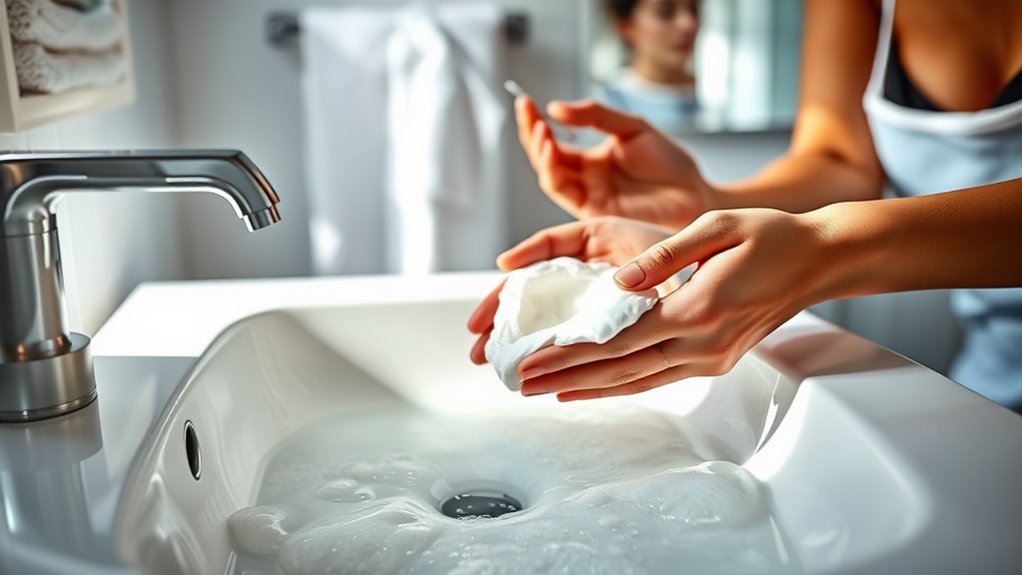The One Cleansing Habit That Could Be Damaging Your Skin Every Day
Over-cleansing your skin is the one damaging habit that could lead to irritation and redness. When you wash your face too often, especially with harsh products, you strip your skin of essential oils. This damages the skin barrier, making it vulnerable and increasing sensitivity. Aim to cleanse no more than twice daily with gentle, pH-balanced cleansers. Listening to your skin’s needs can guide you to better care practices, ensuring a healthier complexion awaits.
Key Takeaways
- Over-cleansing your skin can strip essential oils, leading to irritation and compromised skin barrier function.
- Using harsh cleansers with sulfates and fragrances can exacerbate sensitivity and disrupt your skin’s natural balance.
- Not tailoring your cleanser to your skin type can cause dryness or excessive oiliness, worsening skin conditions.
- Using dirty tools or old cloths for cleansing can introduce bacteria, leading to breakouts and dullness.
- Ignoring signs of over-cleansing, such as tightness and redness, can result in long-term skin damage and increased sensitivity.
Understanding Your Skin Type
Understanding your skin type is crucial for maintaining healthy skin and choosing the right cleansing products. Many people make daily face cleansing mistakes that stem from a lack of knowledge about their unique skin characteristics.
For instance, using a harsh cleanser on sensitive skin can exacerbate irritation, while neglecting moisture on dry skin can lead to flakiness. Oily skin types might benefit from salicylic acid-based cleansers, whereas those with combination skin should look for versatile options.
Identifying whether your skin is oily, dry, combination, or sensitive will guide you in selecting the appropriate products. This understanding not only helps you avoid common pitfalls but also enhances your overall skincare routine, ensuring that your cleansing habits support your skin’s health and vitality. Additionally, knowing the right cleansing options for each skin type can empower you to make informed choices.
The Importance of Gentle Cleansing
Choosing products that match your skin type sets the foundation for effective skincare, but the way you cleanse matters just as much.
Gentle cleansing helps maintain your skin’s natural barrier, preventing irritation and dryness. Harsh cleansers strip essential oils, leading to an imbalance that can exacerbate skin concerns like acne and sensitivity.
You should look for products with mild surfactants, pH balance, and nourishing ingredients. Cleansing shouldn’t feel like a chore; it’s an opportunity to care for your skin. Incorporating gentle cleansing into your routine can significantly enhance hydration without over-drying your skin.
When you prioritize gentleness, you promote a healthier complexion and support skin renewal. Remember, your cleansing routine should enhance your skin’s vitality, not compromise it.
Adopting a gentle approach is key to achieving and maintaining optimal skin health.
Over-Cleansing: A Common Mistake
Over-cleansing your skin can lead to significant damage to your skin barrier, leaving it vulnerable and irritated. When you strip away natural oils too frequently, you risk disrupting your skin’s protective layer, which can result in dryness and increased sensitivity. Understanding the balance in your cleansing routine is crucial for maintaining healthy, resilient skin. Many people may not realize that common signs of over-cleansing can include redness, tightness, and flakiness.
Skin Barrier Damage
While maintaining a clean complexion is essential for healthy skin, excessive cleansing can inadvertently compromise your skin’s barrier. This barrier, composed of lipids and proteins, protects against environmental aggressors and retains moisture.
Over-cleansing strips away these vital components, leading to increased permeability and sensitivity. You might notice redness, dryness, or irritation as your skin struggles to recover. Studies show that a compromised barrier can exacerbate conditions like eczema and acne.
To preserve your skin’s integrity, consider cleansing no more than twice daily with a gentle, pH-balanced product. Incorporating a hydrating toner or moisturizer post-cleansing can also help restore balance.
Natural Oil Stripping
When you cleanse too frequently or with harsh products, you risk stripping your skin of its natural oils. This over-cleansing can lead to a compromised skin barrier, resulting in dryness and irritation.
To maintain healthy skin, consider the following:
-
Choose Gentle Cleansers****: Opt for sulfate-free, hydrating formulas that respect your skin’s natural balance.
-
Limit Cleansing Frequency****: Aim for cleansing twice daily—once in the morning and once before bed—to prevent excessive oil removal.
-
Monitor Your Skin: Pay attention to signs of over-cleansing, such as tightness or redness, and adjust your routine accordingly.
Choosing the Right Cleanser
Selecting the right cleanser is crucial for maintaining healthy skin. You should consider your skin type when choosing a product.
For oily skin, opt for a foaming or gel cleanser that controls excess sebum without over-drying. If your skin is dry or sensitive, cream or lotion-based cleansers are ideal, as they provide hydration while gently removing impurities.
Look for non-comedogenic formulas to prevent clogged pores, and consider ingredients like salicylic acid for acne-prone skin or hyaluronic acid for added moisture. Always avoid harsh sulfates and fragrances that can irritate.
A well-chosen cleanser not only enhances your skin’s appearance but also supports its overall health, setting a solid foundation for your skincare routine. Identifying harsh cleansers can help prevent potential damage to your skin.
Prioritize quality to achieve optimal results.
The Role of Water Temperature
When you cleanse your skin, the temperature of the water plays a crucial role in maintaining its health. Using hot water can strip your skin of its natural oils, leading to dryness and irritation. Ideally, aim for lukewarm water to effectively cleanse without compromising your skin’s barrier. Additionally, using water that is too hot can exacerbate cleansing mistakes that harm your skin barrier, resulting in further damage over time.
Hot Water Risks
While many people enjoy a hot shower as a relaxing ritual, using water that’s too hot can lead to significant skin damage. Excessively hot water strips your skin of its natural oils, leaving it dry and irritated.
This can result in various skin issues, including:
-
Increased Sensitivity: Hot water can exacerbate conditions like rosacea or eczema.
-
Compromised Barrier: A disrupted skin barrier may lead to increased moisture loss and vulnerability to irritants.
-
Premature Aging: Over time, hot water can contribute to the appearance of fine lines and wrinkles.
To maintain your skin’s health, consider moderating water temperature during cleansing.
Ideal Temperature Range
Finding the right water temperature for cleansing can significantly impact your skin’s health.
Ideally, you should aim for lukewarm water, around 98-105°F (37-40°C). This temperature range effectively removes dirt and excess oil without stripping your skin’s natural moisture barrier.
Hot water can lead to dryness and irritation, while cold water may not thoroughly cleanse your skin.
Not Rinsing Properly
Failing to rinse your skin properly after cleansing can lead to a host of skin issues, as residue from cleansers can irritate and disrupt the skin’s natural barrier.
This leftover product can cause breakouts, inflammation, and even dryness, undermining your skincare routine. To ensure you’re rinsing effectively, keep these tips in mind:
- Use lukewarm water to avoid stripping essential oils.
- Rinse for at least 30 seconds to ensure all cleanser is removed.
- Pay special attention to areas like the hairline and jawline where residue often lingers.
Skipping Moisturizer After Cleansing
Many people overlook the importance of applying moisturizer after cleansing, but skipping this crucial step can lead to significant skin problems.
Cleansing strips your skin of natural oils, leaving it vulnerable to dryness and irritation. Without replenishing moisture, you might experience increased flakiness, dullness, or even breakouts due to overproduction of oil.
A good moisturizer helps restore your skin’s barrier, locking in hydration and promoting a healthy complexion. Ingredients like hyaluronic acid or glycerin draw moisture into the skin, enhancing its suppleness.
Additionally, applying moisturizer while your skin is still slightly damp can maximize absorption.
To maintain optimal skin health, make moisturizing an integral part of your cleansing routine. Don’t underestimate its power in achieving and preserving your desired skin quality.
Using the Wrong Tools for Cleansing
Using the wrong tools for cleansing can significantly undermine your skincare routine. The effectiveness of your cleanser can be compromised by the tools you choose.
To ensure you’re maximizing your cleansing efforts, consider the following:
-
Harsh Scrubs: These can irritate your skin and disrupt your natural barrier, leading to inflammation.
-
Old Cloths: Using dirty or worn-out cloths can introduce bacteria, causing breakouts and dullness.
-
Non-Skin-Friendly Brushes: Brushes with stiff bristles can create micro-tears, exacerbating sensitivity and redness.
Selecting appropriate tools is crucial for maintaining skin health.
Invest in gentle, clean, and suitable options to enhance your cleansing experience and protect your skin’s integrity.
Mastering your cleansing routine starts with the right tools in your arsenal.
Listening to Your Skin’s Needs
When you pay attention to your skin’s needs, you can tailor your cleansing routine for optimal results.
Your skin’s condition can fluctuate daily due to factors like weather, stress, and hormone levels. By observing how your skin feels—whether it’s oily, dry, or irritated—you can adjust your cleansing method accordingly.
For instance, if your skin feels tight, it might be telling you to switch to a gentler, hydrating cleanser. Conversely, if you notice excess oil, you may need a formula that effectively removes impurities without stripping essential moisture.
Listening to these cues not only enhances your skin’s health but also prevents potential damage from inappropriate cleansing products. Mastering this skill leads to a more radiant, balanced complexion.
